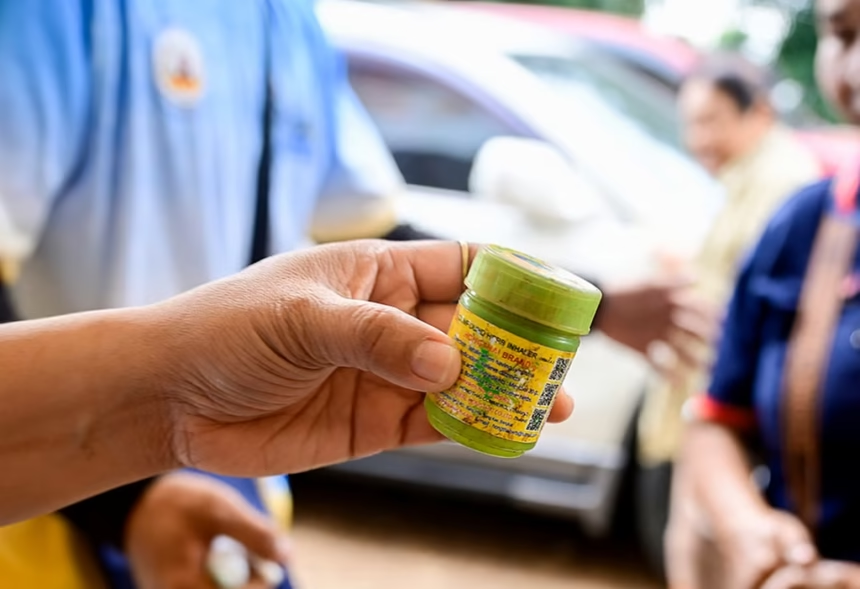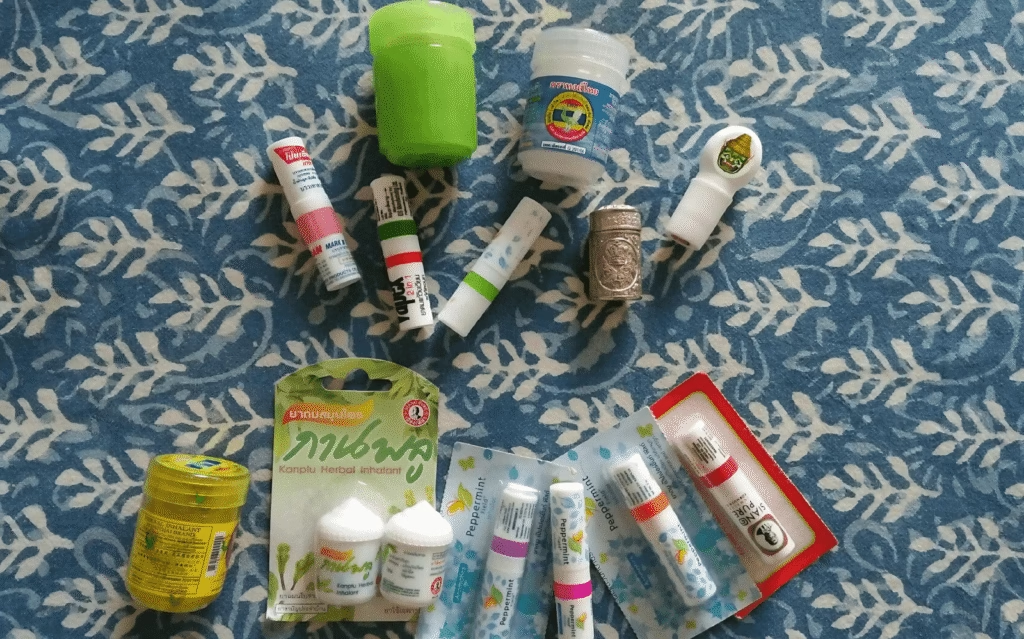BANGKOK – The owner of Hong Thai herbal inhalers has urged the Food and Drug Administration (FDA) to take a more supportive stance, calling for policies that encourage product development rather than relying only on legal action.
Teerapong Rabueathum, founder of Thai Herbal Hongthai Co Ltd, told reporters on Friday that some of the company’s production sites did not have licences.
His statement followed a joint operation by the Consumer Protection Police Division (CPPD) and the FDA at four unapproved facilities linked to Hong Thai inhalers. Officers seized more than 2.3 million items, valued at over 120 million baht, on Thursday.
The raids were prompted by an inquiry into reports of microbial contamination in herbal inhalers under the same brand, which could pose a health risk to users. CPPD officers said they found signs that products were being made at locations not registered with the FDA.
Teerapong said a spike in demand had outstripped the output of the company’s approved factory, so unlicensed sites were used for bottle labelling. He said herbal packing still took place at the licensed facility.
He acknowledged breaching regulations and expressed regret. He added that a new plant in Samut Sakhon is being built and will be subject to inspection when ready.
Teerapong also criticized the FDA for not providing enough practical guidance to herbal manufacturers, despite its pledge to back the Thai herbal sector. He urged the agency to rethink its approach, saying Hong Thai has worked hard to uphold its standing as a trusted Thai brand.
On the contamination concerns, he said the Thailand Institute of Nuclear Technology (Tint) has offered to help sterilize herbal ingredients inside the bottles. He said all Hong Thai inhalers will now go through Tint’s sterilization process.
Thai Herbal Inhalers: A Quick Guide
Thai herbal inhalers, known as ya dom (ยาดม), meaning medicine to smell, are part of daily life in Thailand. These compact tubes, jars, or bottles hold aromatic herbs and essential oils. You will see them everywhere, from market stalls and office desks to temples and sports venues.
They blend long-held traditions with everyday practicality, giving instant relief through inhalation. Far from a niche item, ya dom has fans around the world. Brands like Hong Thai and Poy Sian are exported widely and have attracted attention from celebrities, including Lisa from Blackpink and actor Chris Hemsworth.
History and Cultural Roots
Herbal inhalation in Thailand stretches back more than two millennia, drawing on Thai, Chinese, Indian, and indigenous healing. Early methods included herbal compresses and steam therapy, called yad hom, used by healers to ease breathing and improve well-being through scent.
During the Ayutthaya era, workers and monks carried herbal blends for focus and energy during hard labour or meditation.
Mass production in the 20th century put inhalers within reach of all income groups. Leading names emerged, such as Poy Sian in 1936 with its slim white tube, and Hong Thai, which grew from a street formula in the late 20th century into a major brand.
Today, they are classed as traditional medicines in Thailand and sold everywhere, from 7‑Eleven to temple fairs. Interest has risen again thanks to the global swing toward natural health, with Thai university researchers noting growing use.
How They Work and What Is Inside
Ya dom releases vapours into the nasal passages for quick absorption, creating a cool, energizing feel. Ingredients are natural and often wrapped in gauze for a slow, steady scent. Common components include:
| Ingredient | Key properties | Typical role in ya dom |
|---|---|---|
| Menthol | Cooling, decongestant | Soothes irritation, clears sinuses |
| Eucalyptus oil | Antiseptic, loosens mucus | Aids breathing, eases congestion |
| Camphor | Mild stimulant, anti-inflammatory | Eases headaches, lifts alertness |
| Borneol | Analgesic, supports circulation | Helps with dizziness and nausea |
| Lemongrass or clove | Aromatic, antimicrobial | Adds scent, promotes relaxation |
| Pepper or turmeric | Warming, anti-inflammatory | Sharpens focus, supports digestion by scent |
Formulas vary. Green blends, such as Hong Thai Original, tend to be stronger with mint and camphor. White blends are gentler with more menthol. Scents range from citrus and mint to spiced herbal notes. With regular use, they can last from one to twelve months, though the strength often drops after two months.
Everyday Uses
In Thailand, ya dom is a handy pick‑me‑up for daily life, from humid commutes to long shifts. Common uses include:
- Respiratory relief: helps with nasal congestion, sinus trouble, and allergies.
- Headache and dizziness: eases motion sickness, vertigo, or fatigue, popular with drivers and travellers.
- Mental lift: boosts focus and wards off drowsiness, used by students and meditators alike.
- Stress and calm: offers gentle aromatherapy for tension or brain fog, used by athletes before events.
- Other uses: a short‑term aid for mild asthma symptoms, nausea, or to soothe insect bites when dabbed on skin.
How to use it: uncap, hold beneath one nostril, and inhale gently for 2 to 5 seconds. Repeat on the other side. Use as needed, and avoid overuse to prevent irritation.
Benefits and What Research Says
These inhalers are made from plant‑based ingredients and appeal to people seeking simple, non‑drug options. Relief from congestion is linked to menthol’s cooling action and the expectorant effect of eucalyptus. Traditional use and early studies support short‑term benefits for breathing comfort and mood. Larger clinical trials are still limited, so evidence is growing but not definitive. Many users report a quick, pleasant lift without medication.
Precautions and Possible Side Effects
Ya dom is generally safe for short‑term use, but it is not for everyone:
- Avoid use if you are pregnant, breastfeeding, or have chronic asthma or serious respiratory conditions, as vapours may irritate.
- Not recommended for children under 12 without advice.
- Overuse can cause irritation or headaches, so do not inhale for long periods.
For ongoing symptoms, speak with a healthcare professional. Ya dom supports comfort; it does not replace medical treatment.
In Thailand, ya dom is more than a product. It is a small daily ritual that offers focus and comfort in a busy world. If you are curious, try one on your next visit and see how the scent works for you.















